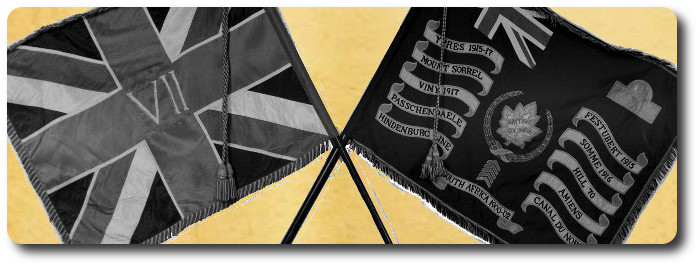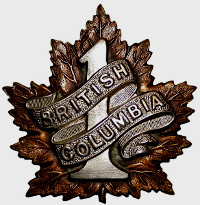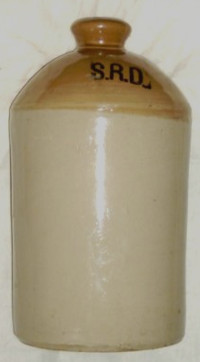Topic: CEF

A Taste of Old Times
Buried on a World War I battlefield, Tiny's crock is full of liquid history.
By Stephen Franklin, Weekend Staff Writer
Weened Magazine, Vol. 10, No. 45, 1960
Ottawa Citizen, 5 November 1960
For a fortunate bunch of Old Sweats in Vancouver, the night of Saturday, Nov. 12, 1960, will be one to remember. On that night they will be swigging liquid history—the contents of a gallon crock that is, in a manner of speaking, a gift from King George V brought to them through the courtesy and artfulness of an under-age infantryman, 429278 Pte. Dudley Seymour. Yessir!
 The occasion is the annual reunion of the survivors of the 7th Battalion, B.C. Regiment, Canadian Expeditionary Force, and the very special tot they will be drinking is army-issue rum buried beneath a Flanders hedgerow at 7:30 A.M. June 3, 1916, and unearthed on a summer evening last year, if anyone can lay his hands on the nose of a German shell, he will drink the rum from it in true trench style. The toast will be a war that none can ever forget, to absent friends and, no doubt, to the man who hid the rum, dug it up and is pouring it, Tiny Seymour.
The occasion is the annual reunion of the survivors of the 7th Battalion, B.C. Regiment, Canadian Expeditionary Force, and the very special tot they will be drinking is army-issue rum buried beneath a Flanders hedgerow at 7:30 A.M. June 3, 1916, and unearthed on a summer evening last year, if anyone can lay his hands on the nose of a German shell, he will drink the rum from it in true trench style. The toast will be a war that none can ever forget, to absent friends and, no doubt, to the man who hid the rum, dug it up and is pouring it, Tiny Seymour.
Today Tiny is a ham-fisted giant of a Vancouver Island logger, a yarn-spinning whisky-loving, plain-spoken man who lives on the shores of Georgia Strait in the village of Royston with his wife, his old war wounds and a case of diabetes. His life as a rum-runner, a timber cruiser and a successful small logging operator has given him the flavor and something of the appearance of a cross between Wallace Beery and W.C. Fields.
Oddly enough, it was an officer nicknamed Charlie Chaplin who set the whole chain of events in motion. Tiny was in No. 3 Company. "We were dug in behind the front line at Sanctuary Wood a mile down the Menin road from Ypres," (Seymour recalls), "and we were going up at 8 o'clock that morning (it was June 3) to try to hold where the Germans had broken through the Third Division.
"I was 17 then but I liked my rum and I fell in three different times that morning for my issue. Then Capt. Fielding called me over )I can't remember his first name, but we called him Charlie Chaplin. He was from down east and the son of a Chief Justice or something, I think, and he had a brother killed over there.)
 'Anyway, Capt. Fielding said, "Private Seymour, take these two jugs of rum over to Major Ford.' 'But sir …' 'No buts, Seymour. We're in a hurry. On the double.' "
'Anyway, Capt. Fielding said, "Private Seymour, take these two jugs of rum over to Major Ford.' 'But sir …' 'No buts, Seymour. We're in a hurry. On the double.' "
Tiny shrugged and did as he was told. Capt. Fielding apparently did not know what he did—that Maj. Ford ("He died in Montreal about four years ago.") was already a casualty, wounded by a german shell.
"I took the two crock of rum and headed down the communications trench to my own funk hole behind this hedge, dug quickly into the dirt, buried the crocks and hurried on back. I thought we could use it later that day."
At 8 A.M. 500 of them went in. Tiny came back with only 28 other men and three officers, but not to the same place. They re-grouped the remnants elsewhere, clear of the German bombardment.
Before long Tiny, who had enlisted when he was only 15 ½ and been shipped overseas as a replacement in 1915, moved on to the Somme and a third wound. Then, with his guardian angel working overtime, he was attached to the Royal Engineers engaged in countermining the Vimy tunnel. The Boches blew it up and of 49 men he was the only survivor, escaping with a stomach wound which sent him to hospital and home for good.
After his discharge in 1919 came roisterous years in the woods of Vancouver Island and aboard boats running rum down the Pacific coast to the U.S. in prohibition days. Gradually the two buried crocks of rum became more than the subject of just another yarn for the boys. They became an obsession. By last year Tiny could well afford a long trip to Europe. He and his wife took ship for Europe, hired an old poilu, René Coudray, and his seven-passenger Cadillac to drive them from Paris to the old battlefields and the unforgotten rum.
Tiny knew that Sanctuary Wood had been preserved as a memorial, helmets, rifles, unopened cans of bully beef strewn still where they lay, trenches, wire and no-man's land starkly reminiscent of the past. The Belgian caretaker told him he must have permission from the Canadian government to dig for his rum. "But," he shrugged, "I go off duty at 7 this evening."
That night 4 ½ feet down, Tiny's shovel scraped something solid. Up came the two crocks, strung together with the wooden tag on them marked "No. 3 Coy, 7th Battn."
Tiny and eight old comrades polished off the first gallon of rum at a truly memorable party in the Piccadilly Hotel in London a few weeks later. The rum was tangy but still good an potent.
Getting the other gallon crock into Canada was the hardest part of the entire 44-year saga. It took months of finagling, the assistance of a lawyer from his old regiment, an importer's license, $11.10 federal duty, $11.75 B.C. Liquor Board fees and $1.14 provincial sales tax. There was also the strong suspicion that somewhere along the line some so-and-sos had been checking the contents with their gullets instead of their noses, before Tiny finally took possession. He took a test swig there and then, under the disapproving eye of officialdom, pronounced the contents smoother than the first crock and stashed the rum determinedly away for Nov. 12, and the reunion.
Usually about 100 officers and men turn up at the Hotel Georgia for the affair. "I guarantee there'll be a lot more who'll turn up this year," grunts Tiny Seymour, "and every one of them ready to swear blind they were at Sanctuary Wood when I buried the rum."

